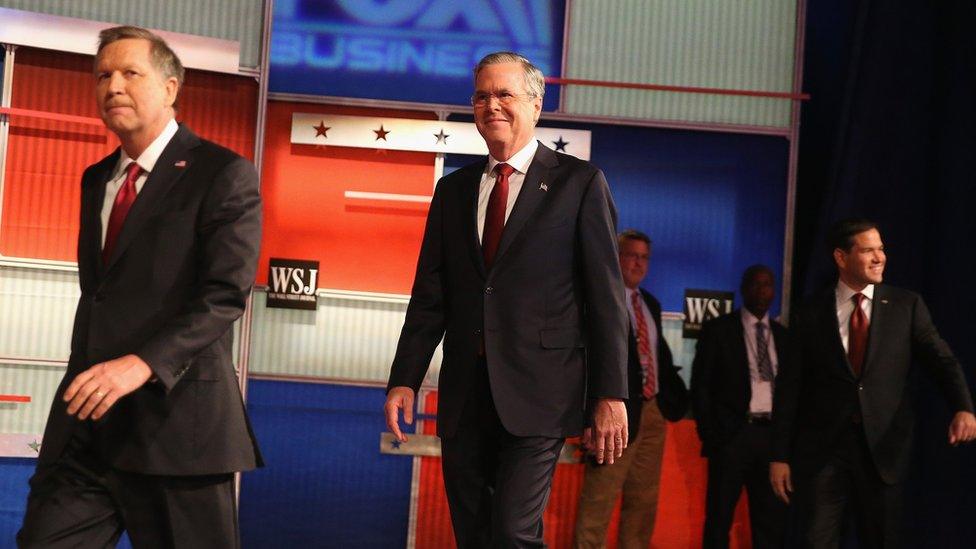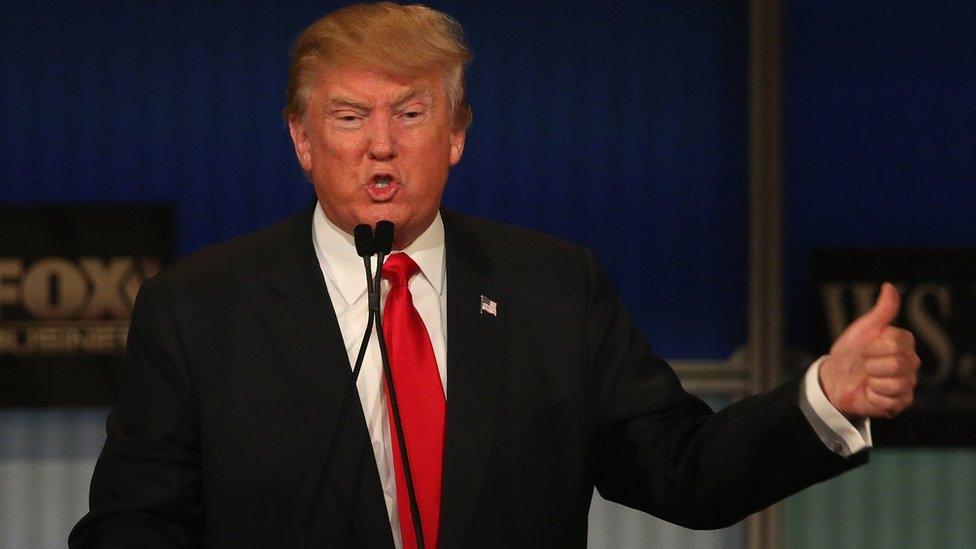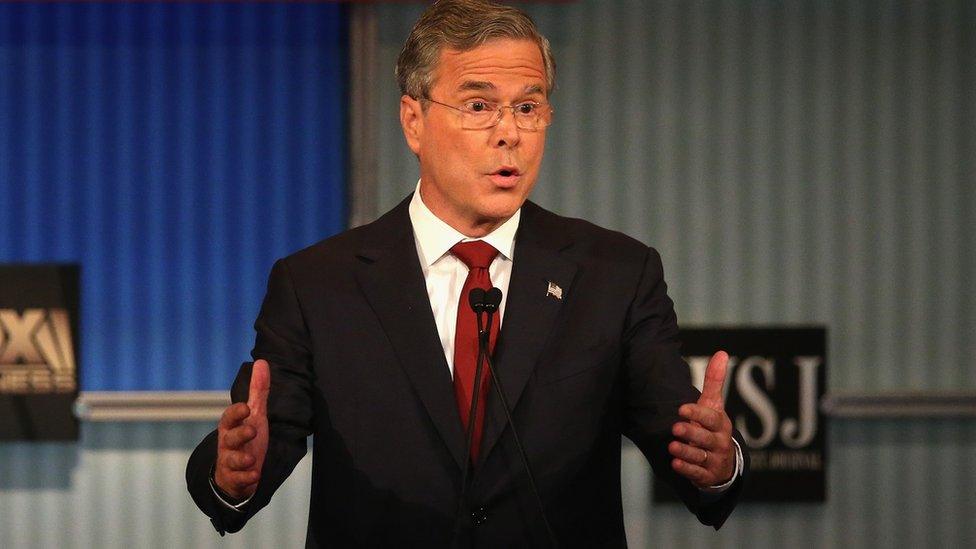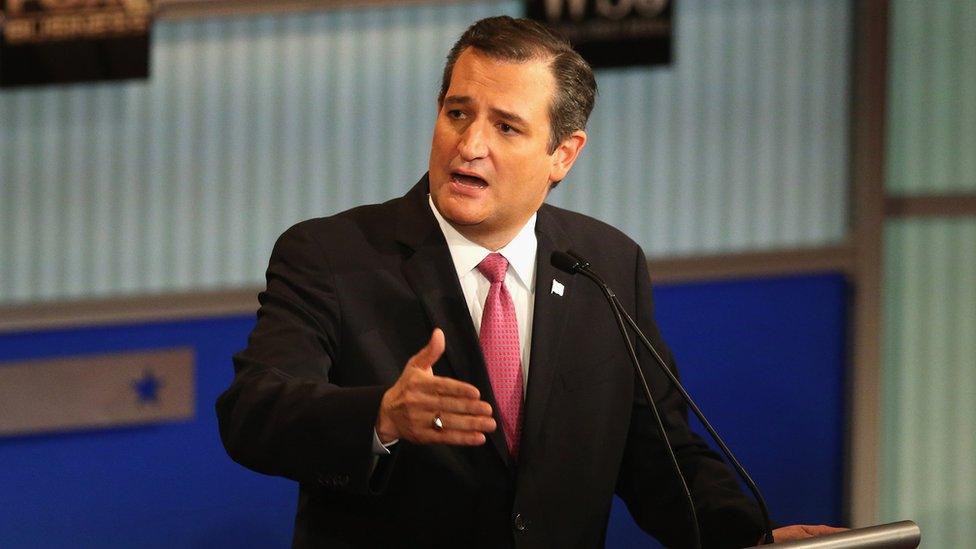Republican debate: Winners and losers as party fractures
- Published

A debate in which Senator Marco Rubio memorably bashed philosophy graduates exposed some key philosophical differences within the Republican party.
On the issues of immigration, national security and the financial industry, candidates traded sharp barbs and engaged in a substantive exchange of views.
The tensions underline the often perilous cross-currents within the party that the eventual nominee will have to contend with.
Here's a look at how it played out - and who likely ended up on top.


Donald Trump speaks favourably of President Dwight Eisenhower's programme of deporting Mexican immigrants in 1954
Immigration
Amnesty or no amnesty? To deport or not to deport? A question about a US appeals court striking down Barack Obama's attempts at unilateral immigration reform set up the night's first pyrotechnics.
Donald Trump - The New Yorker owned the immigration in earlier debates and had the first crack at the topic again. He stood by his position that the US must deport all 11 million undocumented immigrants in the country and build a wall on the US-Mexico border. He compared his plan to one advanced by President Dwight Eisenhower, which moved more than a million Mexicans back across the border. Left unsaid was the rather unappealing name for that 1954 programme, Operation Wetback.
Best line: "We are a country of laws. We need borders. We will have a wall. The wall will be built."
John Kasich - As he did throughout the evening, the Ohio governor flashed some sharp elbows and went on the attack.
"If you're not going to have my back," he told the moderators, "I'm going to have my back." He went on to say Trump's deportation plan was a "silly argument" and "not an adult argument".
Best line: "If people think that we are going to ship 11 million people who are law-abiding, who are in this country, and somehow pick them up at their house and ship them out of Mexico - think about the families. Think about the children."
Jeb Bush - The former Florida governor's strategy was clearly to turn any answer into an attack on Democratic frontrunner Hillary Clinton as early as possible, and he did that most effectively in his immigration response.
Like Kasich, he said mass deportations were unrealistic, adding that such a plan wasn't "embracing American values". Undocumented immigrants, he said, should be allowed to earn legal status if they pay a fine, learn English and avoid criminal acts.
Best line: "Even having this conversation sends a powerful signal. They're doing high-fives in the Clinton campaign right now when they hear this."
Ted Cruz - The Texas senator was asked about entitlement reform, but he decided he wanted to have the final say on immigration instead. He picked up Trump's immigration banner after the beating it took from Kasich and Bush, and delivered a rousing-to-the-base monologue that pushed his personal immigrant story and bashed liberal media elites all in one breath.
Best line: "For those of us who believe people ought to come to this country legally, and we should enforce the law, we're tired of being told it's anti-immigrant. It's offensive."
Winner: Cruz won the battle, but the man who didn't speak on the topic - Marco Rubio - likely won the war. The Florida senator was once a leading voice of immigration reform but backed off after the conservative base rebelled. By avoiding what could have been searching questions about being "soft" or indecisive on this issue, he effectively carried the day.


Jeb Bush calls Donald Trump's proposed Syria policy "absolutely wrong"
National Security
The economy was the supposed subject of the Fox Business debate, but it was foreign policy that prompted some of the most heated exchanges. After Ben Carson stumbled through an answer about Mr Obama's recent decision to send US special forces to Syria, the real action began.
Donald Trump: The real-estate mogul pulled no punches in criticising interventionism. He warned that if the US topples Bashar al-Assad in Syria, he could be replaced by someone much more dangerous.
"Look at Libya," he said. "Look at Iraq. Look at the mess we have after spending $2 trillion, thousands of lives, wounded warriors all over the place."
Best line: "We can't continue to be the policeman of the world. We are $19 trillion in debt, we have a country that's going to hell, we have an infrastructure that's falling apart."
Jeb Bush: In the last debate, Bush was panned for a ham-handed attempt to criticise Rubio on his Senate votes. This time around, he left the Florida senator untouched and instead focused all of his cross-stage swipes at Trump. "Donald's wrong on this," he said regarding Trump's Syria answer. "He is absolutely wrong on this."
He compared Trump's view that Russian President Vladimir Putin should be allowed to take out the so-called Islamic State as something akin to a board game like Monopoly. "That's not how the world works," he said.
Best line: "We're not going to be the world's policeman, but we sure as heck better be the world's leader."
Carly Fiorina: The former computer company executive joined the Trump pile-on, saying that he "fancies himself a very good negotiator" but he should know enough not to deal with Putin from a position of weakness.
She called for increased military spending, missile defence in Poland and expanded military exercises in the Baltic states to "make sure that Putin understands that the United States of America will stand with our allies".
Best line: "We must have a no-fly zone in Syria because Russia cannot tell the United States of America where and when to fly our planes."
Marco Rubio: The Florida senator has touted his Senate foreign policy experience on countless occasions and was the next to weigh in, throwing red meat to the Republican base.
Putin is nothing but a gangster. Obama treats Israel with less respect than he does Iran. Radical terrorist groups are threatening US interests across the globe. As always, the senator delivered a focused, smooth answer. For the fourth-straight debate, he emerged as a clear foreign policy winner.
Best line: "Either they win or we win, and we had better take this risk seriously. It is not going away on its own."
Rand Paul: The Kentucky senator was a Trump-style anti-interventionist before Trump rocketed on the scene. He has often appeared reluctant to advocate foreign policy views that place him at odds with many Republican voters, however. Perhaps in an acknowledgement that his chances of winning the nomination have all but faded, he was much more vocal on the subject this time.
He criticised Rubio for being willing to spend trillions of dollars on increased defence. He said a no-fly zone in Iraq was unrealistic. And he added the Iraq war was a mistake. Those positions have long been part of Paul's libertarian beliefs - and he finally started forcefully defending them.
Best line: "When you think it's going to be a good idea to have a no-fly zone over Iraq, realise that means you are saying we are going to shoot down Russian planes. If you're ready for that, be ready to send your sons and daughters to another war in Iraq."
Winner: The anti-interventionist wing of the Republican Party just isn't that big. Regardless of who won on debate points, Rubio, Bush and Fiorina just aren't going to lose when they offer a full-throated endorsement of US military prowess.


Ted Cruz says he would "absolutely not" bail out big banks in another financial crisis
Wall Street
The bailouts of the financial sector during the 2008 economic collapse was one of the prime motivating factors behind the rise of the grass-roots conservative Tea Party - but it was also a programme initiated by George W Bush's Republican administration. The scars from that fight were once again apparent when moderator Neil Cavuto asked the candidates if they'd be in favour of future big-bank bailouts.
Ted Cruz: After a stretch where he had all but disappeared from the debate, the Texas senator came roaring back with a firm answer where the candidates before him like Rubio and Bush had equivocated. Cruz - who, it should be noted, is the husband of a Goldman Sachs partner - said he would "absolutely not" bail out big banks again.
Wall Street, he said, benefits from big government largess. He condemned the Federal Reserve as a bunch of "philosopher kings", blamed them for the recent economic collapse and called for a return to the gold standard.
Best line: "I have spent much of my adult life enforcing the law and defending the Constitution. And the problem that underlies all of this is the cronyism and corruption of Washington."
John Kasich: The Ohioan obviously had been looking for an opening to tout his credentials as an accomplished governor and former senior member of Congress, and he decided this was his chance.
He derided "philosophical concerns" like Cruz's and said that executives, when faced with a crisis, have to figure out how to help people in need. In the heated exchange that followed, Cruz accused Kasich of favouring big banks over Main Street, prompting the governor to explain that he would differentiate between those who could afford financial losses to those who couldn't - eliciting groans from the audience.
Best line: "Philosophy doesn't work when you run something. And I've got to tell you, on-the-job training for president of the United States doesn't work."
Winner: Cruz once again flashed his debating chops, forcing Kasich into the unenviable position of having to defend big banks - which even among Republicans isn't a popular place to be.